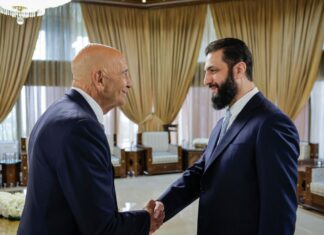
In recent years, a disturbing trend has emerged in Europe as individuals with ties to the Assad regime in Syria have sought asylum and refuge in various European countries, only to be discovered and charged with possible war crimes and crimes against humanity. These cases shed light on the complexities and challenges of vetting asylum seekers and refugees, as well as the ongoing repercussions of the Syrian conflict.
One such case involves Tariq Zuhdi Al-Kharshan, the leader of the Syrian Earthquake militia affiliated with Assad’s forces. Reports of his arrival in Europe have surfaced, raising concerns about the presence of individuals with alleged ties to war crimes seeking shelter on European soil. Al-Kharshan’s history of involvement in suppressing demonstrations and leading a militia responsible for defending military installations against opposition forces has sparked outrage and calls for accountability.
This is not an isolated incident. Numerous individuals with ties to the Assad regime, including former military members and militia leaders, have been identified in Europe, raising questions about the vetting process for asylum seekers and the potential for war criminals to evade justice by seeking refuge abroad. The emergence of smuggling networks capable of transporting individuals from regime-held areas to Europe for a price further complicates the situation, highlighting the need for enhanced border security and screening measures.
In Germany, the arrest of a Syrian suspect, Ammar A., on charges of participating in crimes against humanity, torture, and war crimes has underscored the gravity of the situation. His alleged involvement with Hezbollah and the commission of atrocities against civilians in Syria has prompted a swift response from German authorities, signaling a commitment to holding individuals accountable for their actions, regardless of their attempts to seek asylum.
Similarly, the trial of a member of the Al-Quds Brigade in the Netherlands for war crimes and crimes against humanity has drawn attention to the presence of individuals with ties to the Syrian regime facing legal proceedings in European courts. The accused’s refusal to respond to charges and the allegations of involvement in violent arrests and torture further highlight the complexities of prosecuting individuals with ties to foreign conflicts on European soil.
The arrest of a Syrian refugee in the Netherlands on suspicion of heading a military torture center in Syria has raised concerns in the country regarding verifying identities and ensuring refugees have no ties to proscribed organizations or taken part in crimes during their time in Syria. Highlighting the potential for individuals with ties to war crimes to exploit the asylum system. The allegations of torture and sexual violence against civilians during the suspect’s tenure in Syria have prompted calls for thorough investigations and robust measures to prevent individuals with such backgrounds from evading accountability.
These cases underscore the need for enhanced cooperation between European countries, as well as with international organizations and human rights groups, to ensure that individuals with ties to the Assad regime and various militias and terrorist organizations, or who have may been involved in the commission of crimes against humanity are not able to seek refuge and evade justice in Europe. The complexities of vetting asylum seekers and refugees, particularly those with ties to foreign conflicts, require a comprehensive approach that prioritizes accountability and the protection of vulnerable populations.
As Europe continues to grapple with the influx of asylum seekers and refugees from conflict-affected regions, the cases of former Assad regime members and militia leaders seeking shelter within the EU remains a challenge and moral obligation inherent in providing refuge to those in need while upholding justice and accountability for the gravest of crimes.








